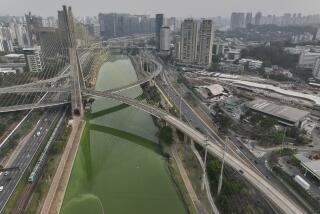Rio Hopes Earth Summit Helps to Improve Its Troubled Image
RIO DE JANEIRO — The newspaper O Globo counted a total of 15 homicides in Greater Rio last weekend, but it was no big deal. The body count appeared under a modest headline near the bottom of Page 14.
For Rio de Janeiro, site of the U.N. Conference on Environment and Development, multiple murders are routine news. Deep poverty and massive pollution also are commonplace.
As the 12-day Earth Summit opened Wednesday, putting Rio under the world’s spotlight, this crowded and troubled metropolis is eager to reclaim its fame as a sunny playground in a spectacular seaside setting. Sadly, dark bruises mar its beauty. With an estimated population of 10 million and an underdeveloped system of public services, Rio is a casebook of urban ailments that afflict mushrooming cities throughout the developing world.
In addition to the Earth Summit, a parallel environmental conference for non-governmental organizations is under way in Flamengo Park beside Rio’s shimmering Guanabara Bay. Participants in the parallel Global Forum are advised not to swim in the bay’s badly polluted waters. About 470 tons of untreated sewage from the city pours into the bay every day.
Visitors are also warned against carrying money or wearing jewelry on Rio streets. Muggers and thieves abound.
Suzanne Riverin, 38, a Canadian high school teacher attending the Global Forum, said that she came to Rio with trepidation but that “actually, it’s beautiful.”
The streets seem considerably safer because augmented police patrols and even army troops are providing special security. Riverin said that she felt “oppressed” when she saw soldiers on the streets with automatic rifles but that people told her: “ ‘You’re lucky they are out here. You should feel safe, not oppressed.’ ”
On Wednesday, the government news service Agencia Brasil reported that armed robbers stole 400 videocassettes of an ecology film that were bound for the Earth Summit meeting on Rio’s outskirts. The robbers presumably were disappointed--the cassettes, in four languages, have little or no commercial value in Brazil.
Gangs hold up Rio banks and other businesses almost daily, and they traffic in drugs in the city’s impoverished hillside slums, called favelas. In some favelas, police are unable to maintain a presence and the gangsters are the law. A drug gang killed two federal police agents in a favela Sunday night.
Thousands of impoverished youths and children rob, burglarize and mug throughout the city. Last year, about 400 minors were killed, many by death squads seeking to “clean up” the city.
Rio’s poverty and disorder have increased this year as Brazil has struggled to cope with a withering recession and double-digit monthly inflation. In April and May, mobs looted two dozen grocery stores.
Rio’s economic despair is deepened by its crime and pollution problems. The thievery and muggings in tourist areas such as Copacabana Beach, and the inadequate sewage and storm-drainage systems that leave the city’s famous ocean beaches polluted, have scared away foreign tourists. In February, the height of Rio’s tourist season, authorities said hotels were half empty.
More to Read
Sign up for Essential California
The most important California stories and recommendations in your inbox every morning.
You may occasionally receive promotional content from the Los Angeles Times.










